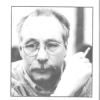W. G. Sebald

W. G. Sebald
Winfried Georg Sebald— known as W.G. Sebald or Max Sebald — was a German writer and academic. At the time of his death at the age of 57, he was being cited by many literary critics as one of the greatest living authors and had been tipped as a possible future winner of the Nobel Prize in Literature. In a 2007 interview, Horace Engdahl, former secretary of the Swedish Academy, mentioned Sebald, Ryszard Kapuściński and Jacques Derrida as three recently...
NationalityGerman
ProfessionWriter
Date of Birth18 May 1944
CountryGermany
Time, that most abstract of humanity's homes.
Like our bodies and like our desires, the machines we have devised are possessed of a heart which is slowly reduced to embers.
How I wished during those sleepless hours that I belonged to a different nation, or better still, to none at all.
At the time I could no more believe my eyes than I can now trust my memory.
Tiny details imperceptible to us decide everything!
In my photographic work I was always especially entranced... by the moment when the shadows of reality, so to speak, emerge out of nothing on the exposed paper, as memories do in the middle of the night, darkening again if you try to cling to them.
We all have appointments with the past.
...the darkness does not lift but becomes yet heavier as I think how little we can hold in mind, how everything is constantly lapsing into oblivion with every extinguished life, how the world is, as it were, draining itself, in that the history of countless places and objects which themselves have no power or memory is never heard, never described or passed on.
I believe that the black-and-white photograph, or rather the gray zones in the black-and-white photograph, stand for this territory that is located between life and death.
Perhaps we all lose our sense of reality to the precise degree to which we are engrossed in our own work, and perhaps that is why we see in the increasing complexity of our mental constructs a means for greater understanding, even while intuitively we know that we shall never be able to fathom the imponderables that govern our course through life.
I felt that the decrepit state of these once magnificent buildings, with their broken gutters, walls blackened by rainwater, crumbling plaster revealing the coarse masonry beneath it, windows boarded up or clad with corrugated iron, precisely reflected my own state of mind...
One has the impression that something is stirring inside [photographs] - it is as if one can hear little cries of despair, gémissements de désespoir... as if the photographs themselves had a memory and were remembering us and how we, the surviving, and those who preceded us, once were.
By all means be experimental, but let the reader be part of the experiment
I wonder now whether inner coldness and desolation may not be the pre-condition for making the world believe, by a kind of fraudulent showmanship, that one's own wretched heart is still aglow.